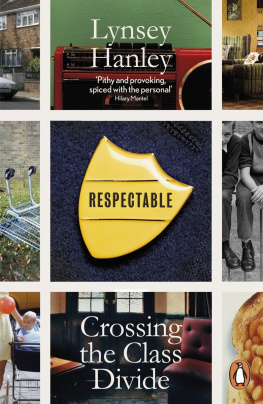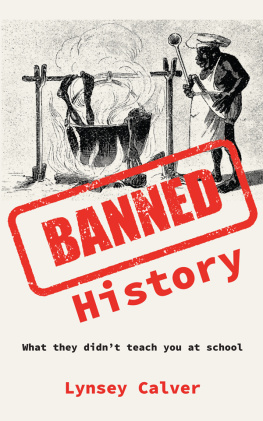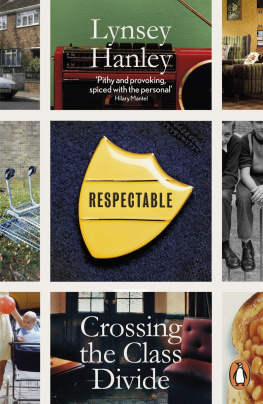Lynsey Hanley - Respectable: The Experience of Class
Here you can read online Lynsey Hanley - Respectable: The Experience of Class full text of the book (entire story) in english for free. Download pdf and epub, get meaning, cover and reviews about this ebook. year: 2016, publisher: Penguin UK, genre: Politics. Description of the work, (preface) as well as reviews are available. Best literature library LitArk.com created for fans of good reading and offers a wide selection of genres:
Romance novel
Science fiction
Adventure
Detective
Science
History
Home and family
Prose
Art
Politics
Computer
Non-fiction
Religion
Business
Children
Humor
Choose a favorite category and find really read worthwhile books. Enjoy immersion in the world of imagination, feel the emotions of the characters or learn something new for yourself, make an fascinating discovery.
- Book:Respectable: The Experience of Class
- Author:
- Publisher:Penguin UK
- Genre:
- Year:2016
- Rating:3 / 5
- Favourites:Add to favourites
- Your mark:
- 60
- 1
- 2
- 3
- 4
- 5
Respectable: The Experience of Class: summary, description and annotation
We offer to read an annotation, description, summary or preface (depends on what the author of the book "Respectable: The Experience of Class" wrote himself). If you haven't found the necessary information about the book — write in the comments, we will try to find it.
Respectable: The Experience of Class — read online for free the complete book (whole text) full work
Below is the text of the book, divided by pages. System saving the place of the last page read, allows you to conveniently read the book "Respectable: The Experience of Class" online for free, without having to search again every time where you left off. Put a bookmark, and you can go to the page where you finished reading at any time.
Font size:
Interval:
Bookmark:



For my parents
I cant remember the day I started calling dinner lunch and tea dinner, but I know that it happened, because thats what I call them now. That must mean Im middle class, where once I was working class; though, no matter how posh I get, I cant bring myself to call (what I now call) dinner supper. Supper for me means (with apologies to the writer Stuart Maconie) having a Kit-Kat in your dressing gown in front of something racy on Channel 4.
Social mobility has its limits: limits which, perhaps, you have to set yourself in order to stay at least halfway related to the person you started out as. It is often talked of as a ladder, which you can climb from bottom to top. The walls are less talked about. This book is about how people try to get over them, whether they manage to or not. I grew up on a West Midlands council estate as part of an extended family which would once have been described as respectable working class. I went to school in the eighties and early nineties on the same estate, in an educational environment which didnt expect or prepare young people to stay on beyond sixteen, and progressed from there to a sixth-form college in a middle-class area full of straight-A students. I went on to the University of London, and from there, eventually, I got to here: writing books about the anxiety induced by being socially mobile. The questions for me have always been: how did that happen? Why does it induce such anxiety? Why is it such a big deal to change social class?
I felt a need to try to write about this subject for a number of reasons. First, as you may already have worked out, because the subject of class obsesses me, as it does a lot of people who started life in one class and have ended up in another. Changing class is like emigrating from one side of the world to the other, where you have to rescind your old passport, learn a new language and make gargantuan efforts if you are not to lose touch completely with the people and habits of your old life, even if they are among the relationships and things that are dearest to your heart. The effect of this is psychologically disruptive, sometimes extremely so; yet its rarely discussed alongside the received wisdom about social mobility, which is that it is unequivocally a Good Thing for individuals and for society as a whole.
Second, and related to the first point, was my desire to explore more fully the idea of the wall in the head. When, in 1989, the Berlin Wall came down, this phrase (die Mauer im Kopf in German) was used to describe the lingering psychological effects on former East Germans of having been shut in by concrete for nearly thirty years. It seemed to sum up the gap between the life Id been primed to expect through innumerable cultural and educational signals and the life Ive ended up having. I borrowed the phrase wall in the head as the title for a chapter in my first book, which was about housing, as it seemed to fit exactly what Id experienced as a child and adolescent living on a council estate or, rather, what I realized after leaving that it was what Id experienced. The estate stayed with me long after I moved elsewhere, partly in the form of a strange kind of vertigo when presented with opportunities and experiences Id grown up assuming were far beyond my reach. I also felt its presence as early as my first term at university, when I got it into my head that everyone in the student union bar wanted to hear a version of my life story which crossed the books on prescription section of the library with Monty Pythons Four Yorkshiremen sketch. The wall in my head manifested itself in a desperate sense that I had to change my destiny at the same time as believing I had no right to do so. Any elements of struggle in the journey from one class to another felt as though they came from forces present inside me, rather than forces from outside. Social factors affecting my experience of life the area I lived in, the schools I went to, my familys income and status filtered inwards and expressed themselves psychologically. This is because, as I hope to show in this book, the higher your social status, the more self-confidence tends to be ingrained in you. The further up the social ladder you are, the more external influences are set up to favour you and your kind, to the extent that privilege becomes invisible and so weightless that literally you dont know how lucky you are. At the other end of the social scale, there is an acute sense of how little social trust or esteem is placed in you as an individual, a feeling that is absorbed and then expressed in low self-confidence.
I was nowhere near the bottom of that scale. As Ill go on to explain, I had respectability on my side, which increased my chances of acceptance on the journey from working class to middle class. But there was a place I wanted to get to more accurately, there was a feeling I wanted to attain, a feeling of freedom and the obstacles to reaching it were almost always, I believed, generated from within. For instance, once I left my secondary school, where few people managed to achieve good passes in their GCSEs, and went to a college where it was usual to get As and Bs, I kept fluffing my exams and missing deadlines for coursework. Not because I was daft, and only partly because I was ill-primed for post-compulsory learning. It was because I assumed that anyone marking my work would see it for what it was: a half-baked, cringeworthy, autodidacts attempt to pass as someone whod always known this stuff. It was only out of sheer pig-headedness that I didnt drop out. After graduating with a lower-second-class degree, I failed the probation periods of my first two jobs after university, unaware that one of the primary skills needed to succeed in professional life is the ability to wing it with style.
Third, I wanted to think and talk about how social class is reinforced and regenerated over time, through language and culture. At what point does talking about a wall in the head, where people set their own limits and restrict their own potential in accordance with their delimited social status, become a self-fulfilling prophecy? Class encourages people to become stuck in ruts that dont look like ruts: you can be yourself, but only as far as your way of being yourself stays within well-defined social parameters. It is hard to be accepted by the group without staying within those limits. Within the working class, an individuals desire to present a respectable self-image can be altered some would say damaged by the lack of autonomy and control that is forced upon people from the outside by government policy, employers practices and the insidious influence of class distinction itself, increasingly expressed through the cultural choices we make.
What I aim to explore in this book is the relationship between those choices: those that are offered and those that we make from the ones we have access to. That, essentially, is what inequality means in terms of how we experience it. Less money means fewer options but not always, and not automatically, worse ones. Less power in crucial areas, such as work, education and housing, means fewer options as well, though in this case it also tends to restrict the ability to accrue more power. The combined forces of outright snobbery and tacit distinction are, I will argue, the most psychologically damaging aspect of class, because they contribute to this undermining of self-belief. Our culture contains many silent symbols more powerful than money. It contains keys that cant be bought, which gain access to rooms whose existence you can barely imagine, unless you get to enter them.
Font size:
Interval:
Bookmark:
Similar books «Respectable: The Experience of Class»
Look at similar books to Respectable: The Experience of Class. We have selected literature similar in name and meaning in the hope of providing readers with more options to find new, interesting, not yet read works.
Discussion, reviews of the book Respectable: The Experience of Class and just readers' own opinions. Leave your comments, write what you think about the work, its meaning or the main characters. Specify what exactly you liked and what you didn't like, and why you think so.













